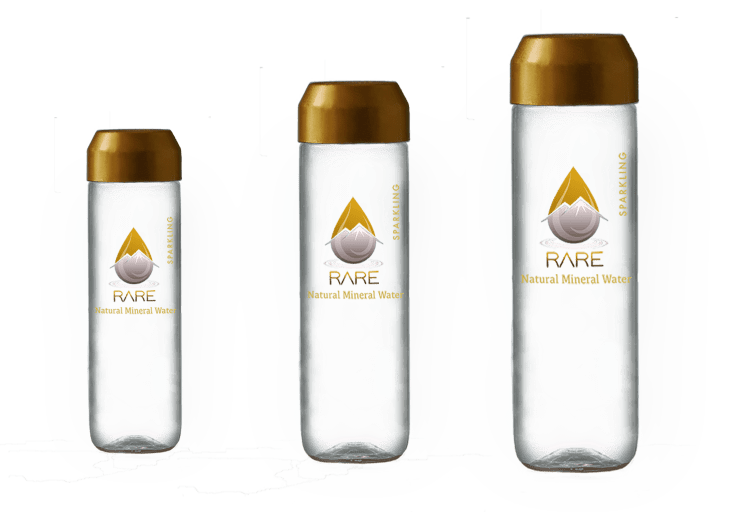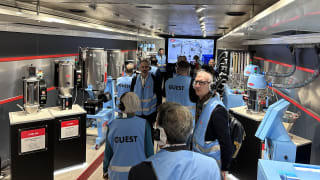Focus on smart technology and automation
The packaging area of each line also features an Innopack Kisters WP wrap-around packer. What’s more, an additional partition inserter has been fitted on the glass line. “This places a cardboard partition in each box to prevent the glass bottles from knocking against one another,” Schneider specifies. “In a country like Armenia, logistics is rated differently from in Western Europe, especially if we look at the state of the roads,” he continues. Unlike the usual practice in this capacity range, where palletizing is often done by hand, both lines include a fully-automatic KHS Innopal PBL-1 palletizer.
“Alongside flexibility Mohammed attached enormous value to having a high degree of automation in this section. This was undoubtedly one of the criteria that tipped the balance in favor of KHS,” smiles Schneider. Accordingly, the factory layout is also very efficient: the glass and PET line are placed opposite one another almost as mirror images in what’s known as a comb arrangement. “It was important to us that we’d be able to operate the lines with as few people as possible,” Mussallam stresses. “As a result, that’s why we also don’t refer to our engineers as operators but as monitors who watch over the line, if you like.”
Bottle design with USPs
Mussallam also has very exact ideas and expectations regarding the packaging for his premium product in particular. He’s opted for a minimalist cylindrical bottle shape with a flat base that’s sealed with a decorative cap as wide as the bottle – blue for the still spring water and gold for the mineral water. This was relatively simple to implement for the glass bottles; however, designing a PET bottle to these specifications presented KHS’ Bottles & Shapes™ experts with something of a challenge. “My initial wish for the brand was that the PET bottles for still water and the glass bottles for carbonated water should look identical,” Mussallam remembers. “I of course realize that a PET container primarily designed for stability should actually look quite dreadful,” he states. “It’s all the more of an achievement, then, that the experts at KHS have managed to construct a stable cylindrical bottle that meets all of my requirements. On no account did I want to have to accept a convex base like the one you find on a sparkling wine bottle. This called for a lot of clever engineering – and patience – from the colleagues at KHS.”Each individual detail of both the PET and glass bottle was designed to reflect the brand’s premium positioning and at the same time ensure maximum food safety.

As opposed to the competition, the bottles are not held together with shrink film but packed in groups of twelve in attractively designed cartons that are then stacked on pallets. This excellently prepares them for what’s often a long journey. For with a population of less than three million, a certain amount of competition and a high percentage of imported water in Armenia, Mussallam reckons on only selling about 10% of his output on the home market. He exports the rest to Russia or Europe, for example – to this end he’s had his water certified according to EU standards – and to the USA, the United Arab Emirates, Kuwait – and of course to his native Saudi Arabia.
Challenging start
The geographical conditions alone meant that delivery of the new equipment was a demanding exercise, Oliver Schneider remembers. “Transport routes in the mountains are by nature rather restricted,” he says. “Our machines weigh several metric tons, meaning it’s not so easy to move them up to an altitude of over 2,000 meters, especially in wintery conditions.” Communication also required a certain amount of flexibility. “If you want to bring people from Saudi Arabia, Armenia and Germany and an installation team from Ukraine, Kazakhstan and Russia together, you sometimes need two interpreters so that two people can understand one another,” Mussallam grins.
Installation nevertheless went smoothly; commissioning was a totally different matter, however, hampered by the corona crisis and the limited freedom of movement for the 15-strong KHS team. “As soon as the first restrictions were lifted, KHS was back on site,” reports Mussallam. “Of course we then always had to adhere to strict rules of hygiene and present countless documents at the airport, for instance. We stationed the colleagues from KHS up in the mountains and strictly controlled access to the plant. It all worked very well; we were able to limit the delay to just four months. We used this time to forge ahead with our marketing campaign and stock up on raw materials so that we’re now in a position to produce four million bottles virtually off the cuff. The infrastructure in the area was also further improved by us turning our attention to the roads and electricity lines.”
The time both lost and gained through corona was also used to qualify the company’s workers and managers. “We chose the best candidates from the universities. We didn’t attach too great an importance to experience because we can fully rely on the quality of the training. The pros from KHS teach our colleagues the necessary skills to make them the best in their field,” says Mussallam. He can now hardly wait for his two lines to be running at full capacity in the near future so that he can start devoting his time to his next project: Mussallam is already dreaming of a second bottling plant with a big returnable glass line so that he can convince even more consumers of the legendary benefits of water from Armenia.



